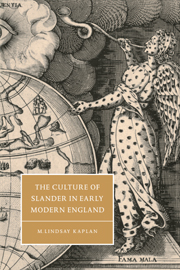Book contents
- Frontmatter
- Contents
- Acknowledgments
- Introduction: censorship versus slander
- 1 The paradox of slander
- 2 Allegories of defamation in The Faerie Queene Books iv–vi
- 3 Satire and the arraignment of the Poetaster
- 4 Slander for slander in Measure for Measure
- Conclusion
- Notes
- Works cited
- Index
- Cambridge Studies in Renaissance Literature and Culture
3 - Satire and the arraignment of the Poetaster
Published online by Cambridge University Press: 03 December 2009
- Frontmatter
- Contents
- Acknowledgments
- Introduction: censorship versus slander
- 1 The paradox of slander
- 2 Allegories of defamation in The Faerie Queene Books iv–vi
- 3 Satire and the arraignment of the Poetaster
- 4 Slander for slander in Measure for Measure
- Conclusion
- Notes
- Works cited
- Index
- Cambridge Studies in Renaissance Literature and Culture
Summary
In the 1596 Faerie Queene, Spenser attempts to champion the social and political benefits of a virtuous state poetics in the face of perceived defamatory attacks against poets and other public servants. By the turn of the century, Ben Jonson takes up a similar cause for satire, an even unlikelier genre. If Spenser felt that his poetry was misunderstood and misrepresented as defamation, Jonson had to face the fact that satire was judged to be explicitly slanderous and seditious; it had been outlawed by the High Commission, which had oversight of all printed materials, in 1599. In the years leading up to the ban, satire had grown to be an extremely popular genre that increasingly registered criticism of the status quo. As Richard McCabe notes, “Such pointed and articulate criticism in so popular a form must have given the authorities cause for concern, for there can be little doubt that the satires were being received by their readership as commentaries upon contemporary events … Everyone knew that real individuals were being attacked in the literary squabbles: why not then in the social satires also?” (McCabe 1981: 191–2). As dissatisfaction with Elizabeth's long reign increased towards the end of the century, the High Commission acted decisively to prohibit the potentially seditious and disruptive genre.
Shortly after the Bishop's Ban, Jonson produced the first of three “comicall satires,” Every Man Out of His Humour, which succeeded in translating the outlawed genre into a popular and licit dramatic form.
- Type
- Chapter
- Information
- The Culture of Slander in Early Modern England , pp. 64 - 91Publisher: Cambridge University PressPrint publication year: 1997

